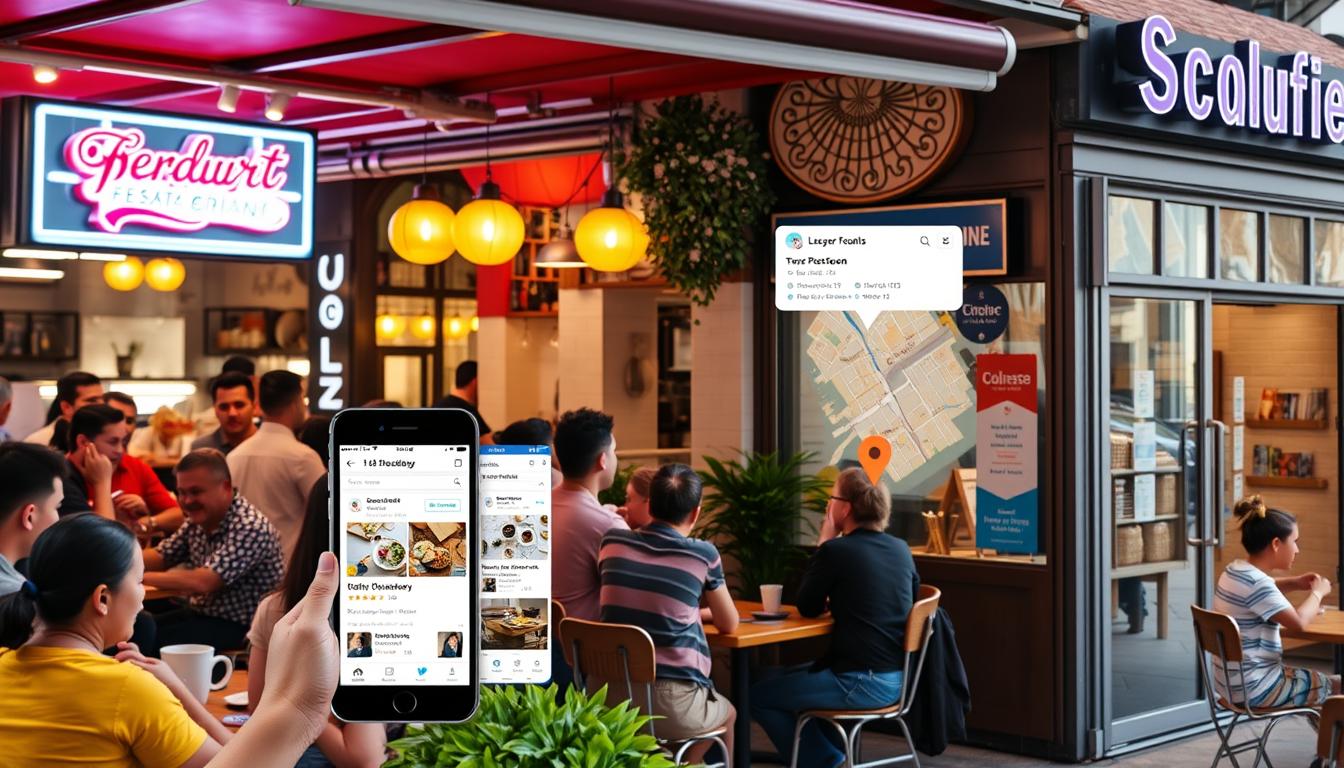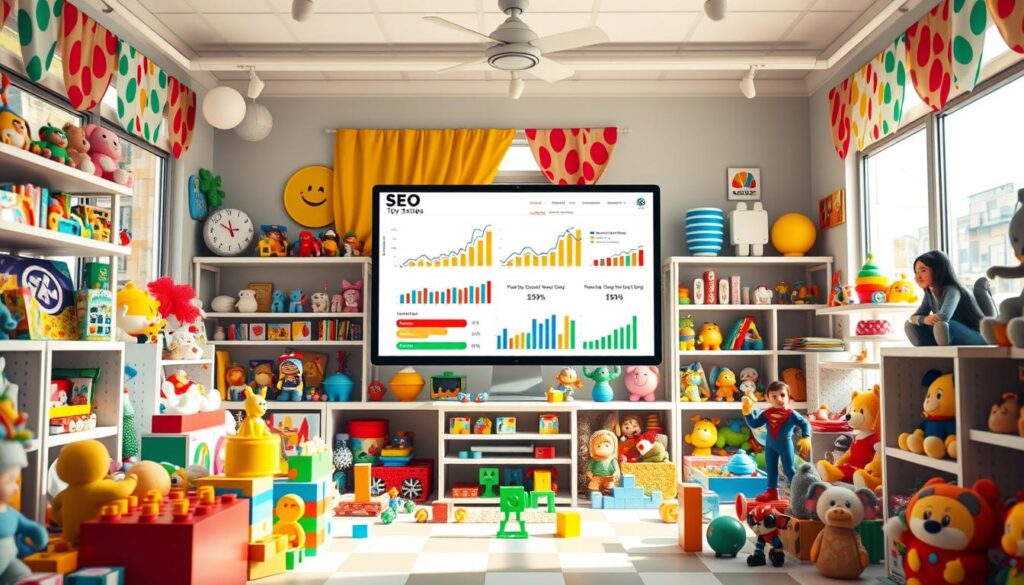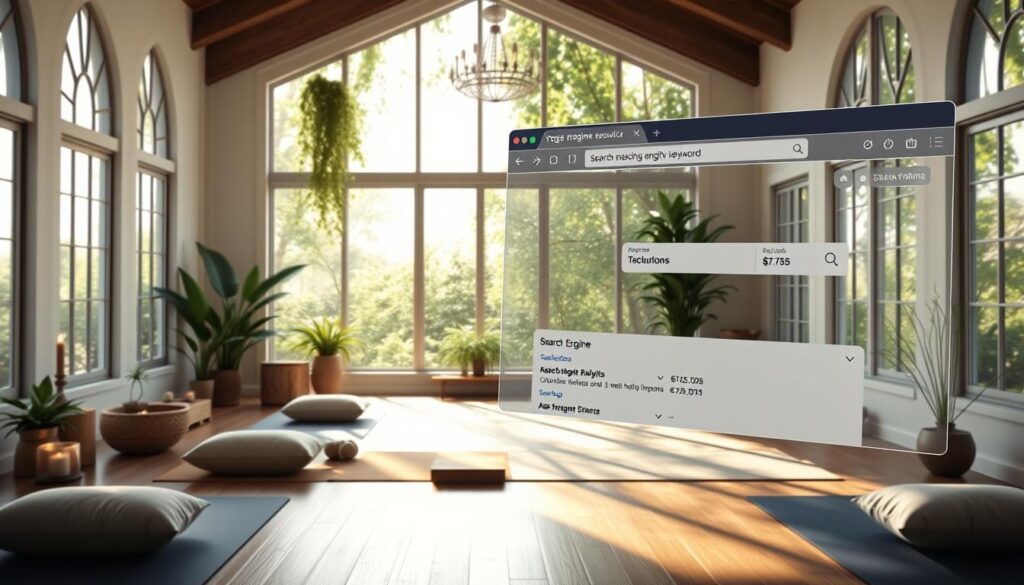In a world with about 750,000 restaurants, what makes some stand out? The secret is mastering local SEO. It’s key for restaurants to get noticed online and draw in more customers. Local SEO can bring in about three times more leads than old-school marketing.
This guide will show you how to make your restaurant shine online. By optimizing your Google Business Profile, you can grab attention. With so many people searching for places to eat nearby, knowing the best SEO practices is crucial.
Are you ready to boost your restaurant’s online presence and get more people coming in? Let’s dive into effective local SEO for restaurants and make sure your place is the go-to spot!
Key Takeaways
- Local SEO can generate three times more leads than traditional marketing.
- Optimizing Google Business Profile listings significantly boosts visibility.
- Long tail keywords attract more qualified leads compared to short tail keywords.
- Engaging content marketing can yield three times more leads for local restaurants.
- Customer reviews enhance online presence and can influence Google’s ranking.
Understanding the Importance of Local SEO for Restaurants
In today’s digital world, restaurants need to be seen online to draw in local customers. Local SEO is all about making a restaurant’s online presence shine for local searches. This way, people nearby can easily find places to eat when they search online.
What is Local SEO?
Local SEO for restaurants means using special strategies to show up in local search results. With 95% of smartphone users looking for restaurants online, it’s key to be seen. By using local SEO tips, restaurants can reach more people and get more visitors to their site.
The Benefits of Local SEO for Dining Establishments
Local SEO is a smart investment for restaurants. Being seen in local searches can lead to more customers, as 77% of diners check a restaurant’s website before going. Also, 64% of people click on the top Google Maps results for restaurants. So, it’s vital for restaurants to make sure they show up high in search results.
- More people walking in because they see you online.
- Getting involved in local events like restaurant weeks boosts your image.
- Good reviews on Yelp and TripAdvisor help your local SEO.
- Having a user-friendly website keeps search engines happy.
Restaurants should use local business schema to make their website data easy to find. This helps search engines understand and show your restaurant’s info in search results. By using these tactics, restaurants can stand out in a crowded market.
Claiming Your Google Business Profile Listing
Getting a Google Business Profile is key for restaurants to find local customers. It’s a main way to share important details that help customers decide. With 87% of people using Google to check out local businesses, it’s a must for restaurants to be there.
Why Google Business Profile is Essential
Google Business Profiles help restaurants show up in local searches. Since 73% of people start looking for food online, having a good profile is crucial. A good profile can also make more money; a Yelp review can increase sales by 5% to 9%.
How to Optimize Your Listing
To make your Google Business Profile better, follow these steps:
- Complete Business Information: Make sure hours, phone number, and address are right.
- Link to Menu: Add a menu link so people can see what you offer easily.
- Incorporate Local Keywords: Use local keywords in the About section to help people find you.
- Promote User-Generated Content: Get people to post photos and reviews to make your profile more real.
- Utilize Online Ordering Links: Add links for online ordering to meet the demand for takeout and delivery.
Common Mistakes to Avoid
Knowing common mistakes can help you avoid problems. Mistakes include:
- Neglecting Updates: Keep your profile up to date with the latest info.
- Ignoring Customer Reviews: Answering all reviews, good or bad, helps keep customers happy.
- Skipping Details: Don’t leave out important details like descriptions or prices.
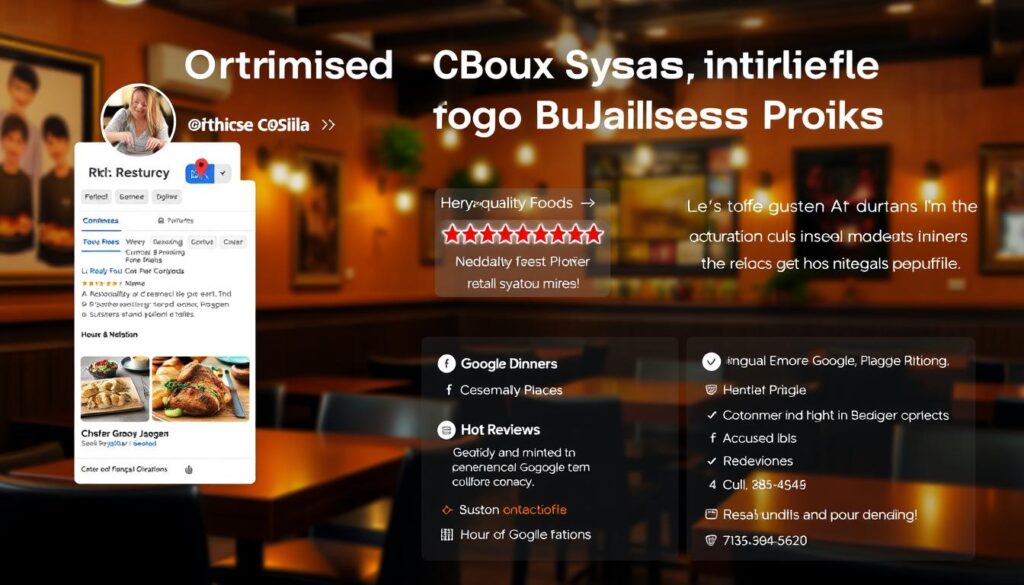
| Optimization Factor | Impact Level |
|---|---|
| Complete Business Information | High |
| User-Generated Content | High |
| Weekly Updates | Medium |
| Local Keywords Inclusion | High |
| Online Ordering Integration | High |
By knowing how to optimize your Google Business Profile, restaurants can get more customers and make more money.
Choosing the Right Keywords for Your Restaurant
Choosing the right keywords is key for restaurant SEO. Targeting long-tail keywords boosts visibility for local customers. These specific phrases match what people are looking for, like “best Italian restaurant in Cleveland.”
The Role of Long-Tail Keywords in Local SEO
Long-tail keywords are vital for local SEO. They meet specific search needs and have less competition. This makes it easier for restaurants to rank higher in search results.
With 46% of Google searches having local intent, and 84% being food-related, using these keywords is crucial. Adding quality and occasion modifiers like “organic” or “birthday dinner” attracts the right customers.
How to Conduct Keyword Research
Doing thorough keyword research is essential. Tools like Google Keyword Planner, Ahrefs, or SEMrush offer insights into popular dining terms. Focusing on local keywords is key since 62% of consumers use Google to find restaurants.
Using brand names and location-specific terms in keywords targets local searchers. This boosts visibility in Google’s 3-Pack listings, which are more visible than regular results.
Integrating Keywords into Website Content
Putting chosen keywords into your website’s content is crucial for SEO. Quality content with local keywords can improve your ranking. Creating location-specific pages and optimizing your Google Business Profile with these keywords also helps.
Since 97% of users rely on others’ opinions, getting online reviews is vital. Positive feedback can make your restaurant stand out in a crowded market.
How to do local SEO for restaurants?
To succeed in local SEO for food businesses, you need a few key steps. First, make sure your online ordering system is top-notch. Next, keep your brand image consistent across all digital platforms. Don’t forget to stay active on social media. These actions are crucial for boosting visibility and drawing in more local customers.
Effective Strategies for Local Search Engine Optimization
Here are some tips to boost your local SEO:
- Optimize Your Website: Add local keywords like “best Italian restaurant in Chicago” to your site’s titles, meta descriptions, and content.
- Claim Your Google Business Profile: This is key to show up in Google search when people look for places to eat nearby.
- Engage on Social Media Platforms: Use TikTok and Instagram to share your menu and connect with younger folks.
Best Practices for Restaurant SEO Optimization
Here are some SEO best practices for restaurants:
- Incorporating Local Keywords: Use local terms to make your restaurant easier to find in search results.
- Encouraging Reviews: Good reviews, especially on Google Business Profile, can make your restaurant look better and rank higher.
- Creating Quality Content: Keep your website fresh with interesting content to attract visitors and improve your search ranking.
For more tips on local SEO for restaurants, check out this detailed guide.
Creating Engaging and Relevant Content
Content is key for local SEO, especially for restaurants. It draws in local customers, making them choose your place over others. This part looks at different content types that attract diners and boost your online presence.
Types of Content That Attract Local Customers
To grab local diners’ attention, make these content types:
- Blogs: Share local food insights, events, or dishes to connect with the community.
- How-to Guides: Give cooking tips or recipes that show your style.
- Videos: Make cooking demos or kitchen tours to visually attract customers.
- Menu Highlights: Use online menus to show off specials, making them easy to find in searches.
Using Content to Improve Restaurant Visibility
Quality, local content boosts your restaurant’s search rankings. Voice search is big, with 27% of users using it. Local keywords in engaging content are key for SEO.
Content that speaks to local interests boosts online visibility and builds loyalty. Share customer stories and highlight community events to connect and engage.
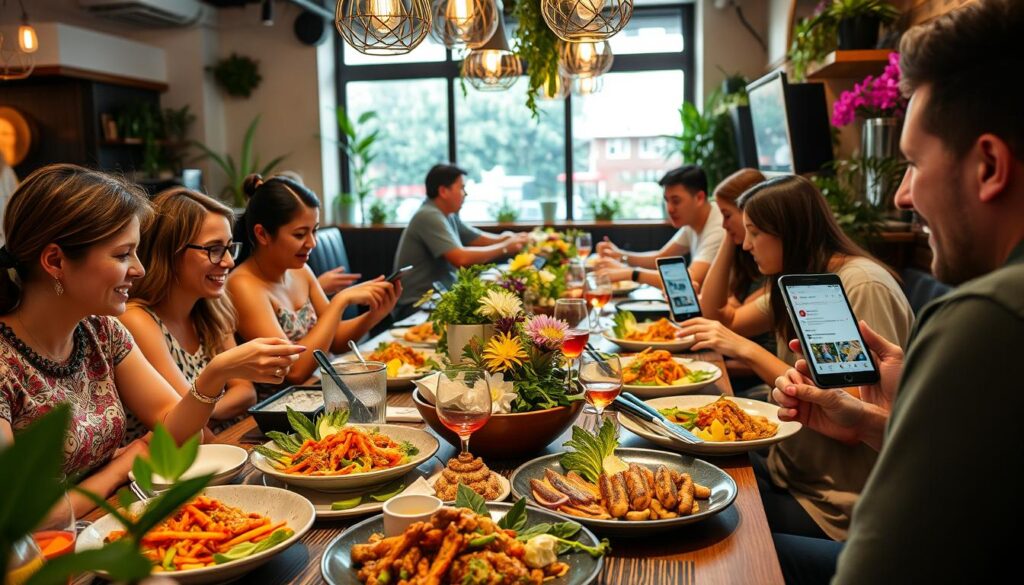
| Content Type | Purpose | Benefits |
|---|---|---|
| Blogs | Inform about local dining trends | Boosts engagement and shares local expertise |
| How-to Guides | Teach cooking skills or recipes | Enhances authority and attracts food enthusiasts |
| Videos | Visually demonstrate dish preparation | Increases engagement via visual storytelling |
| Menu Highlights | Showcase specials and seasonal items | Direct access increases customer interest |
Utilizing Online Reviews to Boost Local SEO
Online reviews are key to making a restaurant more visible online. With 92% of people reading reviews before they go out, it’s important to get and respond to feedback. This helps bring in more customers and builds trust.
By regularly checking and responding to reviews, a restaurant can improve its local SEO. It also helps in building stronger relationships with customers.
The Importance of Customer Feedback
What customers say can really sway someone’s decision to eat at a restaurant. Restaurants with good reviews are seen as more trustworthy. In fact, 88% of people trust reviews as much as personal recommendations.
Being listed on sites like Google, Bing, and Yelp can also boost visibility. Restaurants on Google Places see a 150% increase in local searches. This shows how vital it is to manage and use online reviews for SEO.
Strategies for Encouraging More Reviews
To get more reviews, there are a few effective strategies:
- Prompt customers at checkout or via email.
- Give discounts for leaving a review.
- Chat with happy customers on social media and ask them to share their experiences.
- Make it easy for customers to leave reviews by providing links.
Responding to Reviews Effectively
It’s crucial to engage with reviewers to build a good online image. Reply to both good and bad feedback to show you value what customers say. This shows you’re committed to making things better.
By actively managing reviews, you can increase customer loyalty by 95%. This strengthens your bond with the community. Keeping information consistent across platforms can also boost trust by 80%, helping your local SEO.
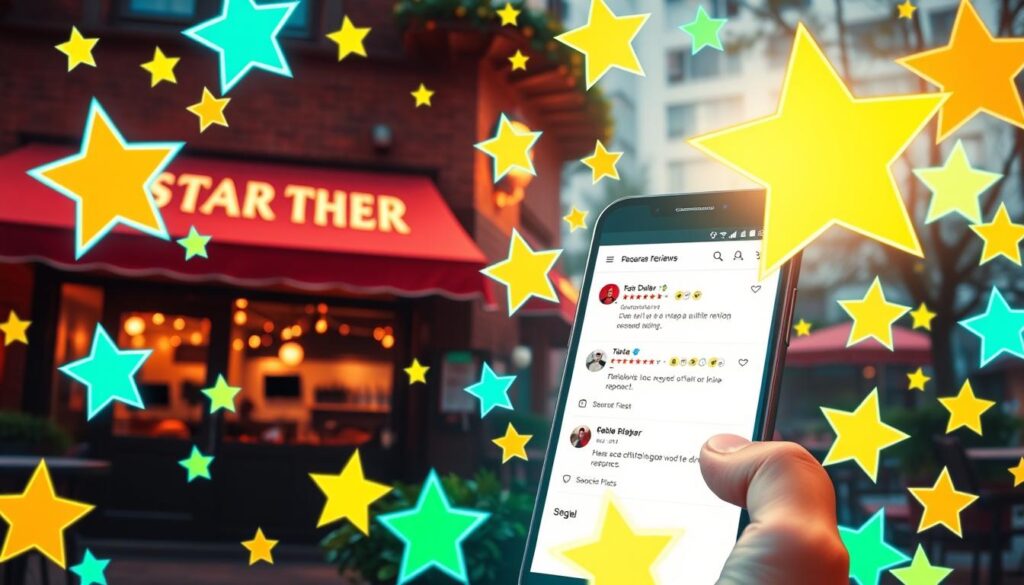
| Statistic | Impact on Local SEO |
|---|---|
| 92% of consumers read online reviews | Increases traffic and improves decision-making |
| 88% trust online reviews | Builds credibility and trust |
| 150% increase in local searches on Google Places | Enhances visibility in local search results |
| 95% increase in customer loyalty with engagement | Fosters long-term relationships with patrons |
Building Local Citations and Directory Listings
For restaurants wanting to boost their local SEO, building local citations is key. Local citations are any online mentions of your restaurant’s name, address, and phone number (NAP). Having accurate and consistent citations across different platforms can improve your local search rankings and build trust with potential customers.
What are Local Citations?
Local citations are important for a restaurant’s online presence. They can be in structured citations in online directories or unstructured citations in articles. It’s vital to keep this information accurate, as search engines like Google favor businesses with consistent NAP details.
Key Directories for Restaurants
Restaurants should list themselves in key directories like Yelp, Google My Business, and TripAdvisor. These listings not only increase visibility but also build trust with consumers. Industry-specific directories can offer better SEO value than broad ones, making them great for citation building. Data aggregators like Neustar Localeze and Factual help spread your business data across many directories.
Ensuring Consistency Across Listings
To get the most from local citations, keeping NAP details consistent is essential. Inaccurate or outdated listings can harm your credibility and search rankings. Regular audits can keep your information current across all platforms. Tools like Moz Local or BrightLocal can make managing citations easier, ensuring your listings are accurate. Adding schema markup for local SEO can also help search engines understand your business information better.
Creating consistent and high-quality local citations boosts your online visibility and attracts more local customers. Restaurants that focus on citation accuracy will likely see better search rankings, more website traffic, and higher credibility in their local markets. For more tips on local SEO, check out this guide.
Mobile Optimization for Your Restaurant’s Website
Today, many people use their phones to find places to eat. This means your restaurant’s website needs to be mobile-friendly. A site that works well on phones helps users find you easier. It also looks good on different devices thanks to responsive design.
The Importance of a Mobile-Friendly Design
A responsive design is key for a good user experience. If your site is easy to use on phones, people will spend more time there. Think about these important points:
- High-Quality Photos and Menu: Use great images and an updated menu to grab attention.
- User Experience (UX): Make your site easy to use with clear buttons and a simple layout.
- Use of Keywords: Add relevant keywords to your content to attract more searches.
Tools and Tips for Mobile Optimization
Good mobile optimization can really help your restaurant online. Here are some tips:
- Google My Business Profile: Claim and update your profile to show up in local searches. Regular updates help engage with customers.
- Encourage Customer Reviews: Positive reviews on Yelp and TripAdvisor can make you more credible.
- Incorporate Schema Markup: This can highlight your reviews and improve your SEO.
For more on local SEO for restaurants, check out strategies and best practices. Also, quality backlinks and listings on trusted directories can boost your rankings. Social media can help increase traffic to your site, making you more visible and engaging.
Conclusion
Understanding local SEO for restaurants is key in today’s digital world. With over 90% of diners searching online, having a strong online presence is crucial. By optimizing your Google Business profile, getting positive reviews, and creating local content, you can boost your visibility and attract more customers.
Mobile optimization and appealing visuals are also important. They can sway diner decisions. Plus, working with local businesses and creating engaging content can help you reach more people. If you’re new to local SEO, teaming up with experts like Revenue Boomers can be very helpful.
As consumer habits change, staying ahead with local SEO can give your restaurant an edge. It helps build stronger connections with customers, leading to loyalty and more visits.

